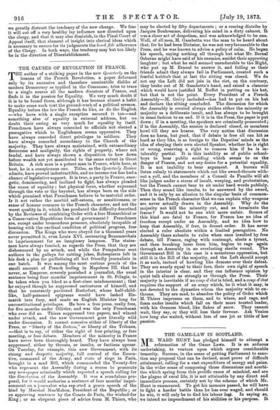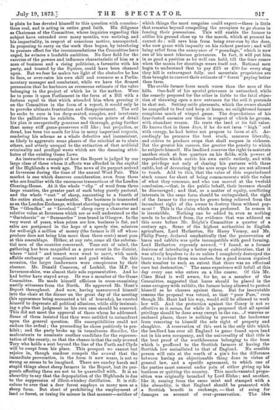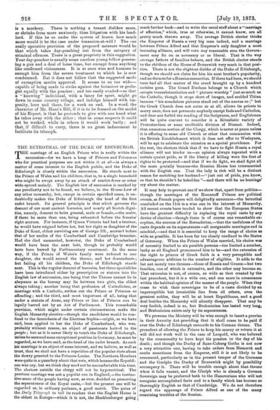THE GAME-LAW IN SCOTLAND.
'VIR. WARD HUNT has pledged himself to attempt a reformation of the Game Lads. It is an arduous undertaking, to venture upon which argues considerable temerity. Success, in the sense of getting Parliament to sanc- tion any proposal that can be devised, must prove of difficult attainment, calling for a vast expenditure of energy and pains. In the wider sense of composing those dissensions and acerbi- ties which spring from this prolific cause of mischief, and are the plague of rural life, it is not attainable by any direct and immediate process, certainly not by the scheme of which Mr. Hunt is enamoured. To get his measure passed, he will have to fight a harder battle than he has ever waged, and should he win, it will only be to find his labour 14. In saying to, we intend no impeachment of his abilities or his purpose. It
is plain he has devoted himself to this question with conscien- tious zeal, and is acting in entire good faith. His diligence as Chairman of the Committee, whose inquiries regarding this subject have extended over many months, was untiring, and his impartiality, in respect of conscious motive, unsuspected. In proposing to carry on the work thus begun, by interfering to procure effect for the recommendations the Committee have urged, he evinces a laudable ambition. No finer field for the exercise of the powers and influence characteristic of him as a man of business and a rising politician, a favourite with his party, and trusted by the Squires, could have been chanced upon. But we fear he makes too light of the obstacles he has to face, or over-rates his own skill and resource as a Parlia- mentary manager and combatant, while we have the firmest persuasion that he harbours an erroneous estimate of the value belonging to the project of which he is the'author. Were he to press it upon Parliament in the form of a Bill with a fortune equal to that which attended him when pressing it on the Committee in the form of a report, it would only be to provoke ultimate frustration and disappointment. The evil he seeks to cure is too deep-seated, complex, and inveterate for the palliatives he exhibits. On various points of detail his plan is unexpectedly generous and thorough, going further than many stiff game-preservers will like ; but prejudice, or dread, has been too much for him in many important respects, rendering his scheme as a whole defective and inconsistent, as likely to aggravate some phases of the mischief as to abate others, and utterly unequal to the extinction of that artificial criminality and prodigal waste which are the damning attri- butes of the existing Game Laws.
An instructive example of how the Report is judged by one large class of those whom it affects was afforded in the capital of the Highlands a week ago. The news of its purport arrived at Inverness during the time of the annual Wool Fair. This market is one which deserves consideration, even from those who are familiar with the enormous transactions of the London Clearing-House. At it the whole "clip" of wool from three large counties, the greater part of each being purely pastoral, and the whole " cast " of sheep, amounting to a fourth of the entire stock, are transferable. The business is transacted as on the London Exchange, without showing sample or warrant. The "Glendhu " or "Inverlaul" sheep carry a character and relative value at Inverness which are as well understood as the " Gartsherrie" or " Summerlee " iron brand in Glasgow. In the very worst of years, when prices are low, business is flat, and sales are postponed in the hope of a speedy rise, missives for well-nigh a million of money (the farmer is ill off whose produce does not bring him more than three rents) must pass at this assemblage. Hither, at any rate, come all the substan- tial men of the counties concerned. Time out of mind, the gathering has been magnified as a great event in the district, where "laird " and tenant were wont to meet, with much affable exchange of compliment and good wishes. On this occasion, the larger landowners were conspicuous by their absence. Mr. Donald Cameron, of Lochiel, the M.P. for Inverness-shire, was almost their sole representative. And he had better have stayed away. He was a member of the Game Committee. He made himself officious in cross-examining nastily witnesses from the North. He approved Mr. Hunt's Report throughout. And now, having manceuvred himself into the chair at the dinner on the great day of the meeting (his appearance being accounted a bit of bravado), he exerted himself to deprecate all political allusions, while slily insinuat- ing a plea that judgment in his own case should be reserved. This did not meet the approval of those whom he addressed. Some of them insisted that they were entitled to animadvert upon the general question. His susceptibilities could not endure the ordeal ; the proceeding he chose positively to pro- hibit; and the party broke up in tumultuous disorder, the malcontents to nominate another candidate for the represen- tation of the county, so that the chance is that the only avowed Tory who holds a seat beyond the line of the Forth and Clyde will be swept from his place. This prospect we cannot but rejoice in, though candour compels the avowal that the immediate provocation, in the form it now wears, is not so strong as seems to be imagined. There are sundry harsh and stupid things about sheep farmers in the Report, but its pro- posals affecting them are not to be quarrelled with. It is an absurdity to say that the depopulation of the Highlands is due to the suppression of illicit-whiskey distillation. It is ridi- culous to aver that a deer forest employs as many men as a sheep farm. But short of prohibiting the employment of land as forest, or taxing its misuse in that manner—neither of which things the most sanguine could expect—there is little that remains beyond compelling the occupiers to go shares in fencing their possessions. This will enable the farmer to utilise his ground close up to the march, which at present he cannot do ; will save him from being over-run by the deer, who now graze with impunity on his richest pasture ; and will bring relief from the annoyance of "poundage," which is now one of his most irksome grievances. In fact, it will put him in as good a position as he well can hold, till the time comes when the mania for shootings wears itself out. Rational men begin to understand that to pay £25 or £30 for every stag they kill is extravagant folly, and mountain proprietors are thus brought to correct their estimate of" forest" paying better than farm.
The arable farmer fares much worse than the man of- the hills. One-half of his special grievance is untouched, while the remedy proposed for the other is liable to the fatal objec- tion of throwing open a new entrance for the evil it pretends to shut out. Setting aside pheasants, which the owner should be compelled to feed and keep at home, no enlightened farmer complains much of winged game. The depredations of his four-footed enemies are those in respect of which he groans, with abundant reason. He rents the land at its full value. He knows that in these days, if he do not farm " high " and with energy, he had better not propose to farm at all. Ac- cordingly he procures the best stock, manures liberally, and strives to produce crops that shall surpass in richness. But the greater his success, the greater the penalty to which he subjects himself. His landlord reserves the right to maintain another stock at free quarters on his fields, with powers of reproduction which outvie his own cattle entirely, and with the privilege not only of sharing his pastures with these cattle, but of devouring by the acre crops they are not allowed to touch. Add to this, that the value of this superinduced stock comes far short of being commensurate with the value of what they consume, and who can marvel at the twofold conclusion,—that, in the public behalf, their increase should be discouraged ; and that, as a matter of equity, conflicting interests in the same farm should be extinguished, the right of the farmer to the crops he grows being relieved from the incumbent right of the owner to destroy them without pay- ment? This is the claim which was preferred. In reason it is irresistible. Nothing can be added to, even as nothing needs to be altered from, the evidence that was adduced on this score before Mr. Bright's Committee a quarter of a century ago. Some of the highest authorities in English agriculture, Lord Flatherton, Sir Harry Verney, and Mr. Philip Pusey, declared emphatically that the preservation of bares and rabbits was quite incompatible with good farming. Lord Hatherton expressly avowed, "I found, as a farmer desirous of introducing a better system of cultivation, that it was utterly hopeless to do so unless I completely destroyed the hares ; to reduce them was useless, for a good season repaired their number to such an extent that there was no effectual cure but destruction." The same experience will befall at this day every one who enters on a like course. Of this Mr. Clare Read is well aware, for he, as a member of the Committee, suggested that hares should be placed in the same category with rabbits, the farmer being allowed to protect himself as be chooses against them. But for inscrutable reasons the proposal was vetoed, so that "poor Puss," even though Mr. Hunt had his way, would still be allowed to work her will. And the protection against the Coney is not so effective as it seems, for while it is proposed that all special privilege should be done away except in the cm, warrens or enclosed places, there is nothing to prevent the landowner from reserving to himself the sole right of property and slaughter. A reservation of this sort is the only title which the landlord has over all England to game found upon land not in his own occupancy, and the universality of that title is the best proof of the worthlessness belonging to the boon which is proffered to the Scottish farmers of having the Scottish law assimilated to that of England. No sensible person will rate at the worth of a pin's fee the difference between having an objectionable thing done in virtue of general law, and a specific agreement, to which one of the parties must consent under pain of either giving up his business or quitting the country. This much-vaunted propo- sition was originally broached by Lord Elcho ; and another, like it, coming from the same mint and stamped with a like absurdity, is that England should be presented with a Scottish benefit in exchange, — that of suing for damages on account of over-preservation. The idea
is a mockery. There is nothing a tenant dislikes more, Or shrinks from more anxiously, than litigation with his land- lord. If this be so unclei the system of leases, how much
more would it be the case under tenancies-at-will The one really operative provision of the proposed measure would be that which takes day-poaching out from the category of eriminal offences. There is a great propriety in this suggestion. Your day-poacher is usually some careless young fellow possess- ing a gun and a deal of loose time, but exempt from anything like confirmed viciousness. It is at once wise and humane to exempt him from the severe treatment to which he is now condemned. But it does not follow that the suggested mode of exemption merits approval. It seems to us too wide— capable of being made to strike against the botaniser or geolo- gist equally with the poacher ; and too easily evaded—so that a " knowing " individual, with a fancy for sport. might go down to some country village, and indulge himself with im- punity, here and there, for a week on end. In a word, the character of Mr. Hunt's Bill, if it is to be framed on the model of his Report, is that he pretends to give with one hand what he takes away with the other ; that in some respects it could not be worked, while in others it would work badly ; and that, if difficult to carry, there is no great inducement to facilitate its triumph.




































 Previous page
Previous page